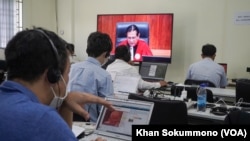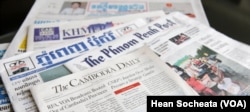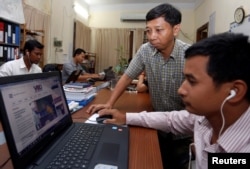Independent media in Cambodia continue to come under attack, with journalists harassed and retaliated against, a new report found.
In its September report assessing the civic space of Cambodia, the international nonprofit CIVICUS rated the country as "repressed."
The nonprofit — a coalition of international civil society members — found "no tangible human rights improvements" in the past year and said the country's media freedom "remains under attack."
Citing an August United Nations report that surveyed 65 journalists in Cambodia, the CIVICUS report said, "Radio stations and newspapers have been silenced, newsrooms purged, and journalists prosecuted."
The dire state for media comes despite Cambodia's obligations to international covenants, said Josef Benedict, the Asia Pacific researcher for CIVICUS.
"Despite the multiple resolutions at the Human Rights Council, the authorities have instead continued to target human rights defenders, union activists and journalists with impunity," Benedict said in a statement.
The report cited issues for the media, including authorities in March revoking licenses at three news outlets for alleged violation of ethics and contracts. CIVICUS said it believes that media reporting on alleged official corruption was behind the move.
The report also cited the arrests — some violent — of journalists, and media being blocked from filming or using drones in some regions.
In the U.N. survey cited by CIVICUS, 80% of respondents reported being surveilled or restricted in the course of their journalism.
Cambodia's Ministry of Information spokesperson Meas Sophorn said the CIVICUS report does not reflect the real situation for press freedom.
In a written response to VOA Khmer, Sophorn said the media sector has evolved and diversified, which allows journalists to carry out their work freely.
"I think that what is mentioned in the report is a biased evaluation and does not completely reflect the real situation, professionalism in journalism, and press freedom in Cambodia," he said via the messaging app Telegram.
"This is an assessment based on one small part, or is one-sided, and it does not include detailed studies from all related stakeholders," Sophorn said.
'Many challenges'
Nop Vy, executive director of the Cambodian Journalists Alliance Association (CamboJA), said the country's media face hurdles, including to their safety and access to information.
"We are facing many challenges such as lack of law for access to information that could help journalists. Another bottleneck is impunity. The government should heed this issue and put forth specific measures to end impunity for crimes against journalists," he told VOA Khmer.
Am Sam Ath, deputy director of the Cambodian rights organization LICADHO, believes the media environment has been dire since 2017, when a government crackdown resulted in some independent media outlets shuttering.
He said journalists are still facing restrictions and believes the government should reform and improve the media sector so journalists can contribute to the nation's development, as well as improve human rights in the country.
"Nowadays, we see many journalists face issues such as detainment while doing reporting," Am Sam Ath said. "The media sector plays an important role in promoting democracy and human rights."
Authorities in August detained five reporters from the Voice of Democracy broadcaster and four citizen journalists who were reporting on land being cleared at a wildlife area in southern Cambodia, CIVICUS said.
All were later released without charge.
Cambodia's Ministry of Information spokesperson said media rights are enshrined under the law and constitution to ensure journalists "can carry out their work and their rights freely without discrimination."
CIVICUS also raised issues related to digital rights, including opposition from U.N. experts and others over a proposed National Internet Gateway through which all internet traffic would flow in Cambodia.
Independent U.N. experts said the plan "poses fundamental freedoms of individuals, namely the freedoms of expression and opinion and the right to privacy," according to digital rights group Access Now.
Ensuring media can work "freely and without fear of retaliation" and the amending of laws, including incitement, insult, and criminal defamation, are among core recommendations CIVICUS has made to Cambodian authorities.
With general elections scheduled for 2023, the international community should "step up efforts to call the government out on these violations," Benedict of CIVICUS said, to ensure "a free and fair" vote.
Cambodia ranks 142 of 180 regions, where 1 has the optimum conditions for media, on the Press Freedom Index compiled by media watchdog Reporters Without Borders.
This story originated in VOA's Khmer service.







